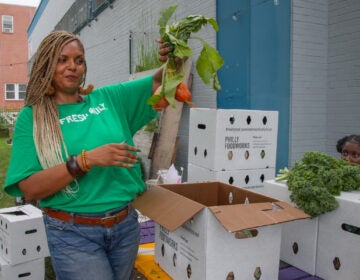Has the plant-based meat revolution fizzled out?
Plant-based meat made a big splash when it first launched, but now sales have fallen, and two leading companies laid off workers. And yet some restaurants continue to grow.
Listen 11:00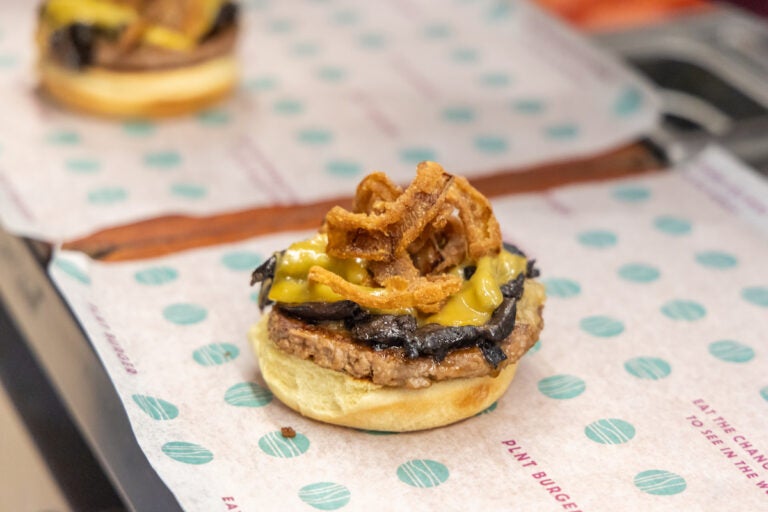
A mushroom bacon BBQ PLNT Burger. (Kimberly Paynter/WHYY)
This story is from The Pulse, a weekly health and science podcast.
Find it on Apple Podcasts, Spotify, or wherever you get your podcasts.
At the entrance of a Whole Foods Market just outside Philadelphia, Jonah Goldman enthusiastically tries to talk to anyone who comes through the door, with two trays of plant-based, deep-fried nuggets.
He’s promoting a restaurant called PLNT Burger downstairs. He co-founded the fast food chain a few years ago in the Washington, DC area. He’s also doing market research to see if people prefer a nugget made out of mushrooms, or one made of soy protein.
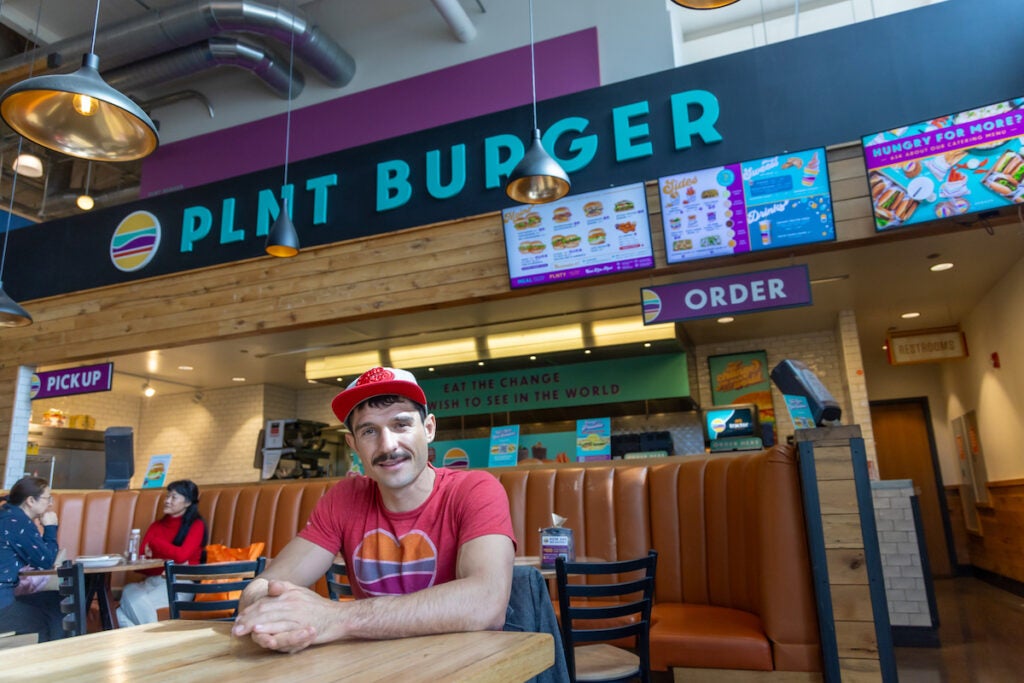
“It is incumbent upon us now to really put ourselves in front of people,” Goldman said.
His pitch is that this is fast food that looks and tastes like the chicken nuggets and cheeseburgers that meat eaters know and love, just without the health and environmental concerns of eating mass produced meat.

Goldman has been a vegetarian since age 10, when he learned about factory farming practices, and is now vegan. But he knows PLNT Burger needs to appeal to a wider customer base to succeed.
“Our target audience is omnivores,” he said. “Vegan/plant-based eaters comprise around 5% of the overall population. So if we’re only serving them, or if we’re primarily serving them, then we just won’t exist as a restaurant.”
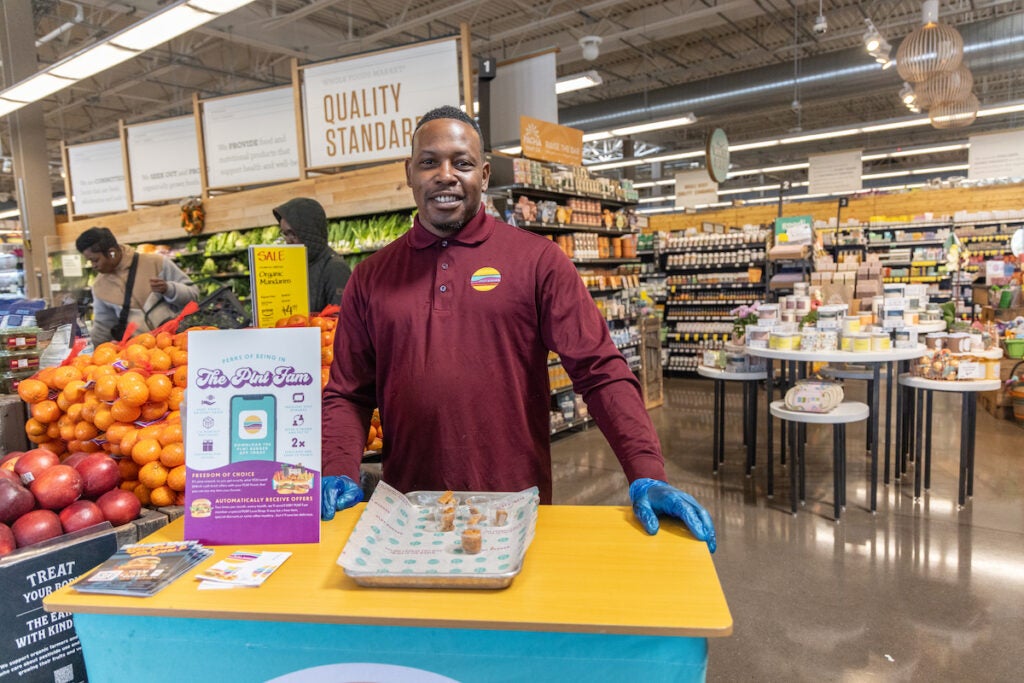
Take regional manager Ronnie McDaniel for example. He started working in the kitchen three years ago and now runs two locations in southeastern Pennsylvania. McDaniel says his family, especially his children and grandchildren, now come to PLNT Burger often instead of McDonald’s.
Goldman says PLNT Burger is already profitable.
They use Beyond Meat for their burgers; but that company is not doing as well financially, despite being part of a revolution for plant-based meat around 10 years ago.
The plant-based meat revolution
At the time, Beyond Meat and Impossible Foods started selling meat that was made of plants. They promised products that would sizzle and look and taste like meat, but with a much smaller environmental footprint and lower health risks. It was a big improvement over the veggie burgers and other products that came before. But now, sales of those products are falling. Both companies have laid off workers recently. McDonald’s, Dunkin Donuts, and Panda Express made headlines when they introduced plant-based meat options, but those menu items did not last. The products have not been as popular in grocery stores as the companies had hoped.
People were excited about Beyond Meat and Impossible Foods’ products, but not that many came back for seconds, said Billy Roberts, a long-time analyst of the food market at CoBank, a bank that gives loans to farms and rural infrastructure businesses.
Roberts said consumers did give plant-based meat products a try.
“They did find them lacking,” he said. “They fell short in taste and flavor and texture, and frankly it may take something fairly significant to get them to re-try those products.”
He said customers choose food mostly based on price and taste. And despite the big strides from Beyond Meat and Impossible Foods, the plant-based meat products are still not where they need to be in terms of attracting a wide customer base.
“It’s definitely a category that has had its chance for strong growth,” Roberts said. “It’s going to take something in the future similar to those profound advances that we saw from Beyond Meat and Impossible … ten years ago.”
Subscribe to The Pulse
Another problem is that the plant-based meat companies simply grew too quickly too fast, said Chloe Sorvino, who leads food coverage at Forbes Magazine. She recently wrote a book called Raw Deal: Hidden Corruption, Corporate Greed, and the Fight for the Future of Meat.
“These businesses really never had enough of a strong foundation to begin with. And even early data showed that when consumers were purchasing these products at grocery stores, they often weren’t buying them again,” she said.
However, Sorvino said more recent versions of the products have improved a lot, so now the challenge is getting customers to try them again.
Attracting meat-eaters
Four years ago, Matt Rafferty attracted a loyal following with Algorithm, his food truck that specializes in vegan fast food like cheesesteaks, milk shakes, and fries. Philadelphia Magazine put them on their best-of list in 2021, and the Philadelphia Inquirer named their vegan reuben sandwich as one of the city’s best sandwiches.
He opened a sit-down restaurant around a year ago, but recently closed because he said he could not attract enough people outside the vegan crowd.
“We’re in a very niche market and it’s very hard to promote to people that are not vegan and looking for it.”
Rafferty will go back to running the food truck.

But across state lines in New Jersey, Brennah Lambert continues to attract a vegan and meat-eating crowd at her restaurant Lesbiveggies. Her restaurant is known for their meatballs, made with Beyond Meat, and tacos that are made with slowly stewed jackfruit instead of pork. She said the restaurant is not just a vegan restaurant, but a place that vegans can take their meat eating friends to and everyone can have a good time.
“They can have a Beyond meatball and it doesn’t have to 100% resemble a meatball, because it’s not. But … it’s gonna taste good and you’re not gonna feel like you’re eating like lentils with flour.”
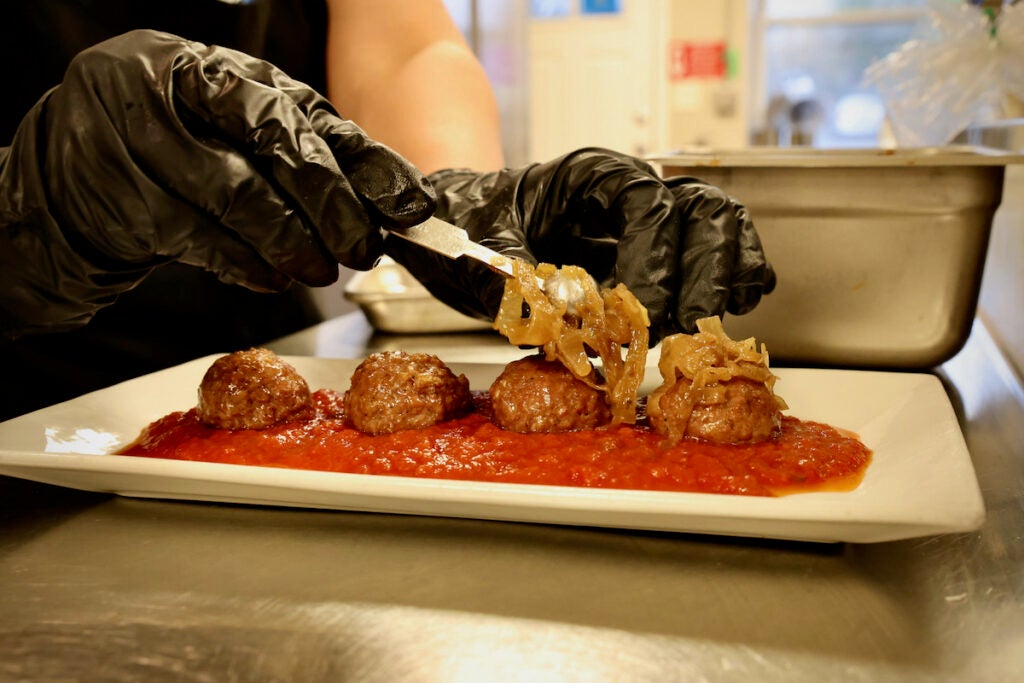
She said the restaurant is packed on the weekends and she’s thinking about buying the property next door to expand.
Honeysuckle Provisions in West Philadelphia sells both meat and plant-based meat, and in one instance, the plant-based meat is outselling the meat product, according to chef and co-owner Cybille St. Aude-Tate. Among other things, the restaurant is known for their black eyed-pea scrapple. St. Aude-Tate said they sell more black eyed-pea scrapple than pork sausage, and recalled one customer who walked in to order a pork breakfast sandwich.
“That was a moment for me to kind of test the waters and see if she would try something different,” said St. Aude-Tate. “I was able to have a conversation and explain a little bit more about the scrapple and she was super interested in it. And she ordered it and she sat there and ate it in front of me, and now she comes back and she only gets the scrapple.”
Plant-based meat is still at the start of its story, said Emma Ignaszewski, associate director of industry intelligence at the Good Food Institute, a non-profit think tank focused on alternatives to animal protein, including plant-based meat. She pointed out that consumers who are growing up right now will make different choices than the people who came before them.
“We’re seeing younger Generations, like Gen Z and Millennials, come into their purchasing power, and these generations are … more likely to report, caring about or making consumer decisions based on sustainability issues.”
For instance, Beyond Meat continues to be a big hit in Europe and some big U.S. companies continue to bet on the change. In March, Oscar Meyer announced they will sell vegan hot dogs.
WHYY is your source for fact-based, in-depth journalism and information. As a nonprofit organization, we rely on financial support from readers like you. Please give today.







